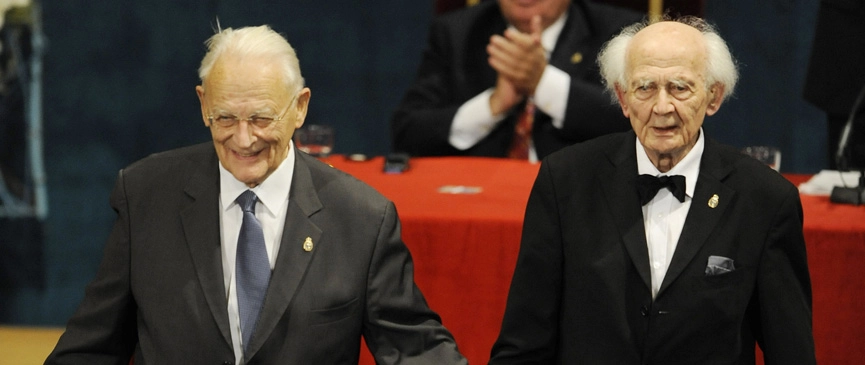Main content
Alain Touraine and Zygmunt Bauman Prince of Asturias Award for Communication and Humanities 2010

Your Highness,
Allow me first of all to express, on my own behalf and on that of other colleagues, my deepest gratitude to you for your presence here today and to the Prince of Asturias Foundation, which has chosen me as one of the laureates of the Prince of Asturias Award for Communication and Humanities. Allow me also to ask you to convey my gratitude to all those who have participated in the selection of the laureates and in the organising of this ceremony.
Furthermore, I wish to manifest here today my admiration for Hispanic culture and to acknowledge my debt to it, that same culture I have experienced in Spain and in many Spanish-speaking countries of Latin America, in which I have lived many years of my life: mostly in Chile, but also in Argentina, Uruguay, Peru, Bolivia, Ecuador, Paraguay, the Dominican Republic and –with great intensity in the last decade– Colombia and Mexico. I would like to make a very special mention of the heartfelt bonds I have with the University of Chile, Mexico’s UNAM and the Ibero-American University of Puebla.
I identify strongly with the entire Latin world: Italy, Spain and Spanish-speaking Latin America, Portugal and Brazil, without forgetting, of course, France. What best characterises the Latin world for me is the lack of permanent, solid correspondence between its citizens and its institutions. France and the French, Spain and the Spaniards, Italy and the Italians… have never been the two sides of the same coin. The relationship all of us have always had with the country we are citizens of seems to be more one of love –with its passions and its conflicts– than one of professional or philosophical identification.
Just two more words. I wish to say to my colleague and friend Zygmunt Bauman that it is an honour for me to share this Prince of Asturias Award with him. I feel equally honoured to find myself here, next to Amin Maalouf, whose books have had a major impact on my thinking.
Finally, I once more wish to express my deepest-felt gratitude to Your Royal Highness for your presence here today.
Your Royal Highness, Mr.President of the Prince of Asturias Foundation, Ladies and Gentlemen,
There are many reasons to be immensely grateful for the distinction bestowed upon me, but perhaps the most important among reasons is that you have classified my work as part of humanities, and as an effort relevant to human communication. All my life I tried to do sociology in the way in which my two Warsaw teachers, Stanisław Ossowski and Julian Hochfeld taught me sixty years ago, and what they taught me was to treat sociology as a discipline of humanities, whose sole, noble and magnificent purpose is to enable and facilitate human understanding and inter-human on-going dialogue.
Which brings me to another crucial reason of my joy and gratitude: the distinction you have bestowed on my work comes from Spain, the land of Miquel de Cervantes Saavedra, the author of the greatest novel ever written, but through that novel also the founding father of humanities. Cervantes was the first to accomplish what we all working in humanities try, with only mixed success and within our limited abilities, to do. As another novelist, Milan Kundera, put it – Cervantes sent Don Quixote to tear up the curtains patched together of myths, masks, stereotypes, prejudgments and pre-interpretations; curtains that cover up tightly the world we inhabit and which we struggle to understand – but are bound to struggle in vain as long as the curtain is not raised or torn up. Don Quixote was not a conqueror – he was conquered. But in his defeat, as Cervantes showed us, he demonstrated that “all we can do in the face of that ineluctable defeat called life is to try to understand it”. This was Miquel de Cervantes’ great, epochal discovery; once made, it can’t be ever forgotten. We all, in humanities, follow the trail which that discovery laid open. It is thanks to Cervantes that we are here.
To tear up the curtain, to understand life… What does this mean? We, humans, would prefer to inhabit an orderly, clean and transparent world in which good and evil, beauty and ugliness, truth and lie are neatly separated from each other and never mix, so that we can be sure how things are, where to go and how to proceed; we dream of a world in which judgments and decisions can be made without the arduous labour of understanding. It is of this dream of ours that ideologies are born - those dense curtains that stop looking short of seeing. It is to this incapacitating inclination of ours that Étienne de la Boétie gave the name of “voluntary servitude”. And it was the trail out and away from that servitude which Cervantes blazed for us to follow – by presenting the world in all its naked, uncomfortable yet liberating, reality: reality of the multitude of meanings and irreparable shortage of absolute truths. It is in such a world, in a world in which the sole certainty is the certainty of uncertainty, that we are bound to attempt, ever again and each time inconclusively, to understand ourselves and each other, to communicate, and so live with each other and for each other.
This is the task in which humanities try to assist fellow humans; at least what they ought to be trying, if they wish to remain faithful to Miquel de Cervantes Saavedra’s legacy. And this is why I am so immensely grateful, Your Highness and Mr. President, for qualifying my work as a contribution to humanities and human communication.
End of main content
